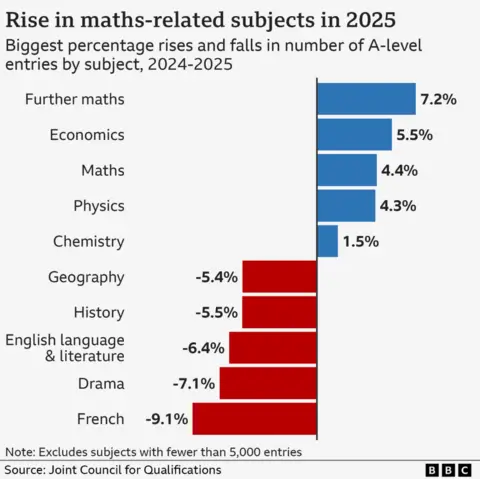
 Getty Images
Getty Images
Maths is a significant contributor to high A-level grades overall as 16.7% of all maths entries scored an A* this year, compared to 9.4% of entries for all A-levels
For the past seven years, girls have outperformed boys in securing the highest A-level grades. But this year it's the boys who have taken the lead in getting the top marks.
The percentage of boys' grades that were A* or A was 28.4%, narrowly beating the 28.2% achieved by girls. It marks a reversal of last year's 0.4% lead for female students.
Boys also strengthened their advantage at the very top of the scale - 9.9% of their entries were awarded an A*, compared with 9.1% for girls.
These are slim margins, but not insignificant ones. Factors including a surge in the popularity of STEM subjects - science, technology, engineering, and maths - are likely to have contributed to this swing.
These subjects have been on the rise for a number of years and are significantly more popular with boys than girls.
For the 12th year in a row, maths is the most popular A-level - and the number of entries is up more than a fifth since 2016 and has increased from last year.
There's also a clear gender divide in who studies it - boys account for nearly two-thirds (63%) of entries and the divide is only getting bigger.
Jill Duffy, chairwoman of the JCQ board of directors and chief executive of the OCR exam board, explains that "proportionally there are fewer girls taking the subject than in 2019".


Sam Perret studied economics at A-level and is off to study it at university in September
Boys' performance in maths improved very slightly this year from 42.5% of entries marked A* or A last year to 42.6% this year. In comparison, girls' results dipped from 41.2% last year to 40.2% this year.
Richard Harry, executive director of qualifications and assessment at WJEC exam board, says maths is a "significant contributor" to high A-level grades overall.
Overall, 16.7% of all maths entries scored an A* this year, compared to 9.4% of entries for all A-levels.
'Don't speculate too much'
Executive director of regulation and compliance at the AQA exam board, Claire Thomson, says that while the percentage of girls achieving A* and A grades is lower this year than their male counterparts, nearly 19,000 more females achieved at least an A due to more girls entering for A-levels in general. Girls made up 54% of all entries.
"It is important not to speculate too much about what has led to any differences between males and females as the figures are small, they do bounce around a bit over time and the causes will be multi-faceted and complex," she says.
Zoe Lewis, Principal and Chief Executive of the Middlesbrough College Group, agrees and says it's still too early to tell if this is significant but "is something to keep an eye on in the coming years".
She adds that the swing is likely due to the "continued growth in STEM subjects and bias towards studying maths".
"There's a lot more information about subject choices and that's perhaps attracting more boys to it."
Business rises, humanities fall
Maths isn't the only subject that continues to rise in popularity. Business studies and economics entries have also increased and Thompson suggests that social media influencers may be fuelling the interest in those subjects.
She explains that both subjects have "a real world relevance" and that students are following influencers in "gaining some entrepreneurial skills so that they can go out and emulate the people that they see all the time on social media".
Figures published by the Joint Council for Qualifications (JCQ) for England, Wales and Northern Ireland show a 5.5% increase in entries for A-level economics compared to 2024, while business studies entries are up 0.6%.


There was a rise in maths-related subjects but a drop in humanities
Ola, a recent engineering graduate, shared a video on social media about why she chose to study A-level business and how it helped her in her degree.
She says that things she studied during A-level business, like accounting, were in her university degree, which made that module "a breeze".
One student at Oaklands College in Hertfordshire shared her business grade on social media, explaining that she chose the subject as it would open up opportunities in the future.
However, humanities like English, history and some modern languages have seen a drop in popularity.
It is the first time since at least 2000 - the earliest available archive data - that no arts or humanities subjects have appeared in the top five most popular subjects.
Meanwhile, the proportion of entries in arts subjects such as drama and music has fallen by 31% since 2010 and is "approaching a one-third collapse", according to an analysis by the charity Campaign for the Arts.
The charity says the arts have been "systematically underfunded and undervalued" in recent years, particularly in English state secondary schools.

 Netflix
Netflix
The creators of Adolescence say they want the show to "causes discussion and make change"
The conversation around boys' academic struggles and fears they are "being left behind" in education has been around for many years, but there was a renewed interest this year with the release of hit Netflix series Adolescence which tells the story of a 13-year-old boy arrested for the murder of a classmate.
Exploring themes of toxic masculinity and the psychological pressures faced by teenage boys, there's been a greater discussion around how boys are supported emotionally and academically.
Asked about whether this renewed focus on helping boys achieve, Education Secretary Bridget Phillipson acknowledged the pressures boys and young men face.
"They face challenges in their lives and external pressures can give rise to some challenges," she said. "I want to celebrate the success of many young men who have gotten the grades they needed."
However, she added that there are fluctuations every year "so there isn't anything to take away at this point".

 3 months ago
96
3 months ago
96

















































